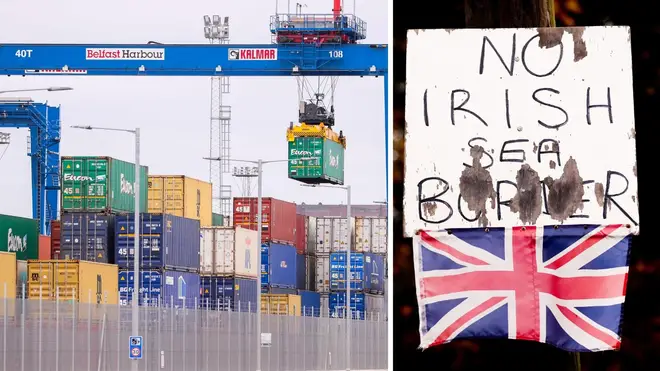
Rachel Johnson 7pm - 10pm
26 April 2022, 18:10 | Updated: 26 April 2022, 18:26

Andrew Marr: Essentially, the Govt intends to blow the Northern Ireland Protocol out of the water
Plans would give ministers power to ignore checks in Irish Sea
The Government is planning to use next month’s Queen’s Speech to threaten to tear up the Northern Ireland Protocol that was agreed with the EU as part of the Brexit deal, LBC has learnt.
Three government sources told LBC that the speech will include a reference to plans being drawn up to give UK ministers the power to unilaterally ditch key parts of the deal signed with Brussels in 2019.
The legislation being planned would allow ministers to suspend checks on goods travelling between Great Britain and Northern Ireland – a key part of the Brexit deal.
LBC understands that, while the speech will not necessarily mention a standalone new bill on the issue, it will refer to the plans being drawn up by vowing to legislate to protect the Good Friday Agreement.

Ministers are still deciding exactly which parts of the Protocol they may give themselves the power to disapply, but one source said they were leaning towards an approach that would give them wide-ranging powers to ditch multiple parts of the agreement if required.
The plans being drawn up are even more far-reaching than the government’s repeated threat to trigger Article 16 – a move that would suspend the controversial Protocol, which requires checks on some goods travelling between Great Britain and Northern Ireland.
Instead, the legislation being planned would bypass Article 16 and the Brexit agreement completely by superseding it with new UK legislation.
The powers would not necessarily be invoked straight away – as ministers still hope the EU will shift its position during negotiations in the coming weeks – but the reference to the plans in the Queen’s Speech is likely to be seen by Brussels as the clearest sign yet that the UK is willing to unilaterally suspend the checks. EU leaders have already warned the UK not to renege on its commitments under international law.
UK government ministers expect the latest move to trigger a fresh backlash from Brussels. One told LBC: “It’s going to cause the mother of all rows.”
Asked about LBC’s story in the Irish Parliament on Tuesday, Irish Taoiseach Micheal Martin warned the UK: “I’m a great believer in adherence to international law, and most modern states are as well, most modern Parliaments are."
However, ministers are more concerned about the response from Washington.
Late last year, Joe Biden said he felt “very strongly” about the Protocol, and members of his top team have been similarly outspoken on the issue.
The UK government plans to step up diplomatic efforts to try to convince Washington of the need to makes changes to the Protocol, citing the problems it is causing in Northern Ireland.
One source suggested that progress has already been made in this area, saying the view in Washington has shifted in recent months from one of outright opposition to tearing up the Protocol to a growing acceptance that some compromise was needed - but there are still worries about what position the Biden Administration would take if the UK unilaterally ripped up the agreement.
A No10 source said no final decisions had been taken, but confirmed that the Queen’s Speech will include mention of the need to protect the Good Friday Agreement and that plans were being drawn up that, if enacted, would allow ministers to unilaterally suspend parts of the Protocol. A final decision on exactly how to proceed is likely to be made after the Northern Ireland Assembly elections next week.
DUP minister Edwin Poots attempted to unilaterally suspend Irish Sea border checks last month but his order was suspended by the High Court. UK government officials believe new legislation will be needed before UK politicians can stop the checks without the EU’s approval
A UK government spokesperson said: “We are keeping this issue under careful review, given ongoing supply chain disruption - including as a result of Russia’s illegal invasion of Ukraine - and wider cost of living pressures.
“It is precisely because of Brexit that we’re able to set an import controls regime which is best suited to our own needs.”